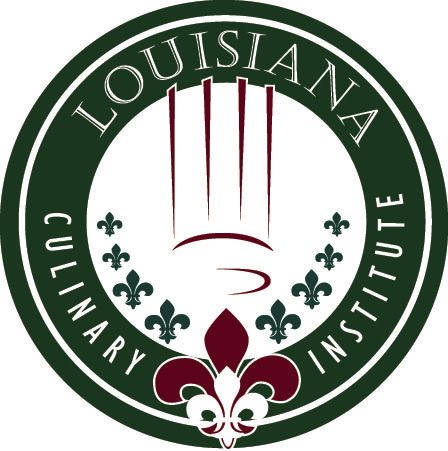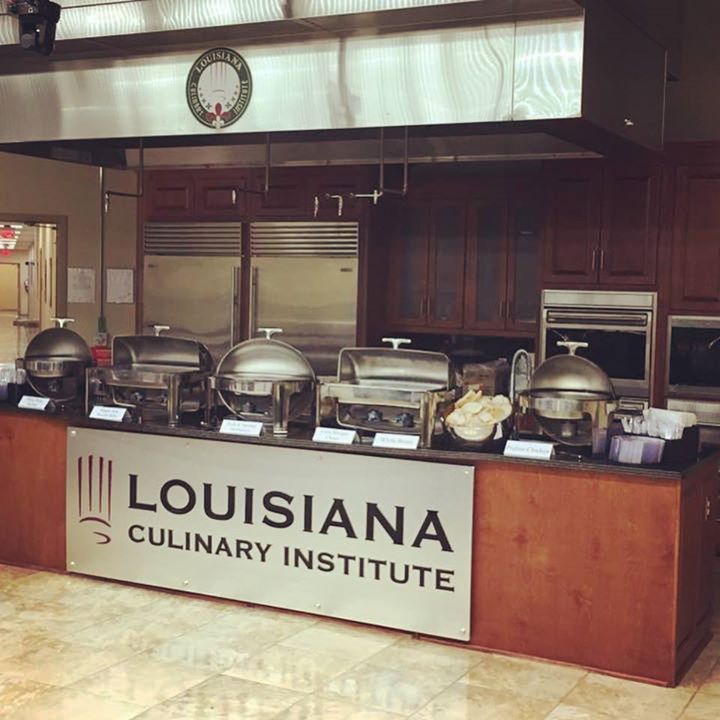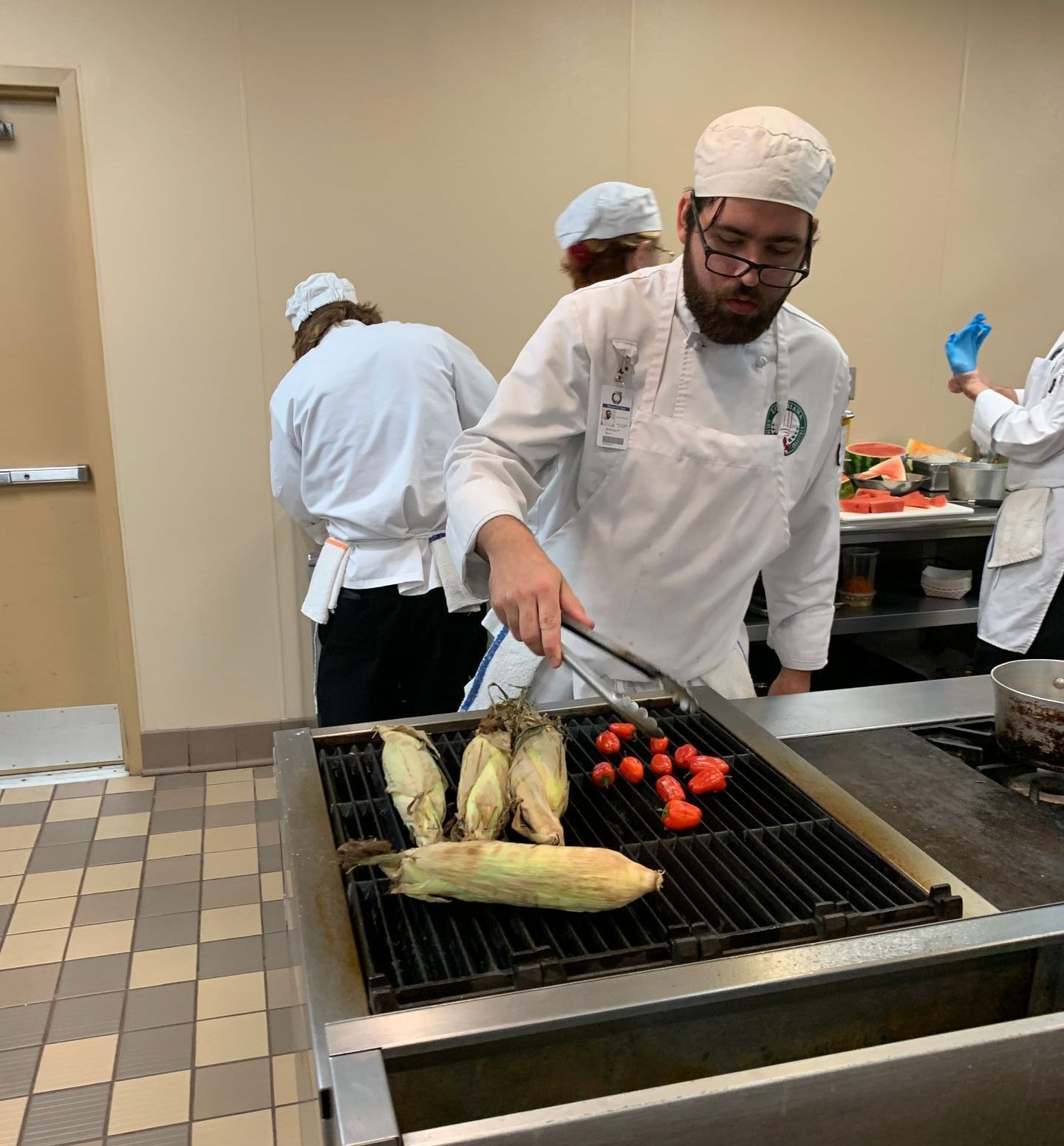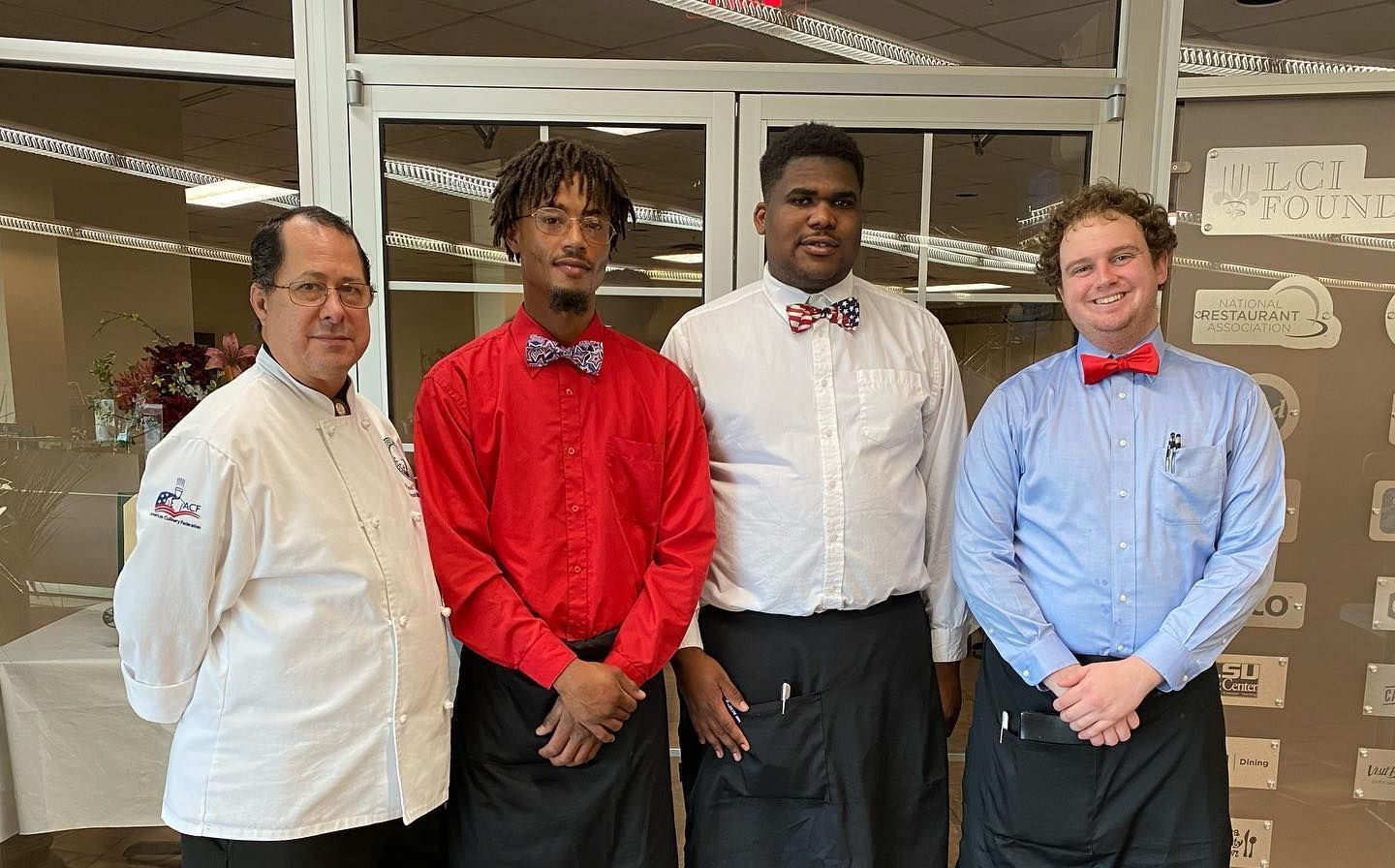OVERVIEW
The professional world in the culinary sector can exceed far beyond the kitchen of a restaurant. There are a variety of roles and responsibilities that require multiple skillsets. From communication and collaboration to creativity and organization, hospitality and culinary management personnel perform important duties. A strong educational foundation combined with market experience is invaluable in building a successful career in hospitality management. It all begins with a degree in hospitality and culinary management, and here is everything you need to know about this degree path.
Classes are held Monday through Thursday, from 8:00 am to 1:45 pm. This is 5 hours per day, 4 days per week for a weekly total of 20 hours (excluding 45 minutes per day for lunch). Additionally, students who do not have transfer credits for appropriate General Education classes will have class every Monday, Tuesday and Wednesday from 2:00 pm to 2:50 pm (for the first 3 semesters). These students will experience a weekly total of 23 hours (excluding 45 minutes per day for lunch). This program is a hybrid of in person instruction online learning.
Hospitality and Culinary Management Video
Hospitality and Culinary Management Program Blogs
COURSE DESCRIPTIONS
First Semester (White Level)
CA 111-ServSafe® Food Safety and Sanitation (30 Lecture Clock Hours/ 2 Semester Credit Hours)
This course is designed to instruct the student in the basic principles of sanitation and sanitary requirements following a HACCP program in receiving, storing, pre-preparation, and cooking and handling foods in a commercial kitchen. Special emphasis is given to time/temperature control, cross-contamination, and personal hygiene. This is the National Restaurant Association Educational Foundation’s (NRAEF) nationally recognized ServSafe® Course and is a Core Credential for the NRAEF ManageFirst Program®. Students are eligible to take the NRAEF certification test upon completion of this course to obtain the ServSafe® Sanitation Certification which is valid for five years.
CA 101-Professional Cooking I (30 Lecture Clock Hours/ 2 Semester Credit Hours)
This course introduces the history of French Classic Haute Cuisine and teaches the fundamentals of professional cooking techniques using moist and dry methods in a commercial food service facility. Students are introduced to basic nutrition and are taught how to incorporate proper nutrition into their dishes. Students are also introduced to the fundamentals of recipe writing and interpretation, as well as the different types of menus used in commercial food service. The student learns how to properly utilize commercial food equipment in a safe and sanitary manner. Pre-preparation techniques are covered with emphasis on the proper use and handling of kitchen knives.
CA 121-Restaurant Production and Service I (30 Lab Clock Hours/ 1 Semester Credit Hour)
Students are introduced to the commercial kitchen and shown how to use and work with the equipment to practice their pre-preparation techniques in learning mise en place. This kitchen laboratory emphasizes proper pre-preparation methods and mise en place. Students are taught how to prep food items for proper cooking and are shown the proper techniques for using all commercial kitchen equipment safely. Proper use of knives is demonstrated with ample time allowed for the students to practice knife cutting techniques.
CA 109-Bread Basics (30 Lab Clock Hours/ 1 Semester Credit Hour)
This course covers basic bread production. The students will gain an understanding of working with breads through study and manipulative skills. Lean, Rich, and laminated breads will be included.
CA 102-Professional Cooking II (60 Lecture Clock Hours/ 4 Semester Credit Hours)
Students are introduced to the use and production of stocks, sauces and soups. The fundamentals of stock making are taught and the students are shown specific stock-making techniques. Students are then shown how to produce the five lead sauces using the stocks produced as well the fundamentals of making clear, thick and National soups.
CA 104–Professional Cooking IV (60 Lecture Clock Hours/ 4 Semester Credit Hours)
Students learn the basics of vegetable and starch cookery as well as the understanding of vegetarian diets. The students learn to identify, handle, process and cook commonly used vegetables, starches, legumes, grains and pasta as well as how to control texture, flavor and color changes and nutrient losses. Students also learn the dynamics of vegetarian diets and how to plan nutritious vegetarian menus.
CA 103-Professional Cooking III (60 Lab Clock Hours/ 2 Semester Credit Hours)
Students learn the basics of meat, poultry and seafood cookery. The students learn to identify the primal cuts of beef, lamb, veal and pork and list the fabricated cuts from each of them. The composition and structure of meat is described in terms of the relationship of the proper cooking techniques used in its cooking. Students are taught the proper handling and cooking of poultry, utilizing both dry and moist heat cooking methods with emphasis of the correct procedure used for the “slow-roasting” of large birds.
OR
CA 110-Introduction to Baking and Pastry (60 Lab Clock Hours/ 2 Semester Credit Hours)
This course covers the fundamentals of the commercial kitchen bakeshop. Students are taught the fundamentals of bakeshop principles in relationship to how they are applied in cakes, pastries, cookies, ice creams, sorbets and pie production in a commercial bakery.
MAT 101-Essentials of Math (Mathematics) (45 Lecture Clock Hours/ 3 Semester Credit Hours)
This course encompasses the basics of practical math. This course offers a comprehensive introduction to the concepts and applications of mathematics utilizing skill building modules which prepare the student with the skills and competencies that they will need to enter the workforce.
2nd Semester (Blue Level)
CA 103-Professional Cooking III (60 Lab Clock Hours/ 2 Semester Credit Hours)
Students learn the basics of meat, poultry and seafood cookery. The students learn to identify the primal cuts of beef, lamb, veal and pork and list the fabricated cuts from each of them. The composition and structure of meat is described in terms of the relationship of the proper cooking techniques used in its cooking. Students are taught the proper handling and cooking of poultry, utilizing both dry and moist heat cooking methods with emphasis of the correct procedure used for the “slow-roasting” of large birds.
OR
CA 110-Introduction to Baking and Pastry (60 Lab Clock Hours/ 2 Semester Credit Hours)
This course covers the fundamentals of the commercial kitchen bakeshop. Students are taught the fundamentals of bakeshop principles in relationship to how they are applied in cakes, pastries, cookies, ice creams, sorbets and pie production in a commercial bakery.
CA 122-Restaurant Production II (30 Lab Clock Hours/ 1 Semester Credit Hour)
The laboratory class is designed for students to practice proper cooking techniques in commercial food service. Students are given an extensive review of cooking techniques and procedures, measurements, knife skills and mise en place and are required to prepare and serve examples of each technique and procedure on meats, poultry, seafood, vegetables and starches for the faculty/staff/student meal service.
CA 132-Restaurant Service II (30 Lab Clock Hours/ 1 Semester Credit Hour)
The laboratory class is designed for students to practice proper serving techniques in commercial food service. Students learn proper serving techniques and wait staff service management.
CA 105–Professional Cooking V (30 Lecture Clock Hours/ 2 Semester Credit Hours)
Students learn the basics of salads, sandwiches, and hors d’oeuvres cookery, as well as the basics of hot and cold food presentation and garnish. Students are introduced to the types of salads produced in food service and their preparation techniques. Techniques for the production of different types of sandwiches are demonstrated as well as the preparation and proper production of hors d’oeuvres. The students are also taught the importance of presenting food attractively and are shown techniques in the use of the balance of color, shape and texture to do so. Students are also taught how to make and use garnishes for use in presenting food more attractively.
CA 106–Professional Cooking VI (30 Lecture Clock Hours/ 2 Semester Credit Hours)
Students learn the basics of breakfast cookery, dairy products and breakfast beverages. Students learn breakfast cookery with a focus on the many types of egg production, breakfast breads and breakfast meats. Students also learn the various types and production of dairy products including a good overall introduction to cheeses. Proper coffee and tea service is also taught in this course.
CA 143-Restaurant Production III (60 Lab Clock Hours/ 2 Semester Credit Hour)
Students practice their cooking techniques in preparing and serving menu courses for the faculty/staff/student meal service. The emphasis in this kitchen laboratory is for students to hone their cooking skills in preparing meats, poultry, seafood, vegetables and starches utilizing both moist and dry heat cooking methods appropriately.
CA 211-Introduction to Hospitality and Restaurant Management (30 Lecture Hours/ 2 Semester Credit Hours)
This course is designed as an overview and introduction to the hospitality and restaurant management industry, with a specific focus on leadership and management techniques. At the end of this course, students take the National Restaurant Educational Foundation’s (NRAEF) ManageFirst® test.
CA 112-Catering and Volume Food Service (30 Lecture Clock Hours/ 2 Semester Credit Hours)
This is an introductory course on catering for food service and hospitality managers which utilizes sound guidelines and a practical approach to operating and managing a catering business. The course includes the guidelines on how to do on and off premise catering, hire and manage catering personnel, writing a contract, sanitation, set up a kitchen, set up and use service equipment, conduct special events and kosher catering along with wine and bar service, menu making and food presentation.
ENG 101-English Composition (Humanities) (45 Lecture Clock Hours/ 3 Semester Credit Hours)
This is a basic course on English grammar and composition designed to provide students with a detailed, structured approach to composition using the three steps of the writing process: prewriting, writing and rewriting. The course includes a review of grammar, offers opportunities for general and career-focused writing, and encourages improvement through addressing the writer’s audience and purpose and by providing tools for proofreading and editing.
3rd Semester (Red Level)
CA 225-Restaurant Production V (60 Lab Clock Hours/ 2 Semester Credit Hour)
Students learn “A La Carte” production techniques and procedures used in full service restaurants while cooking food menu courses and serving food for the faculty/staff/student meal service.
CA 311-Wine Fundamentals (30 Lecture Hours / 2 Semester Credit Hours)
This is a thorough introductory course on wine which presents culinary arts and hospitality students with the practical and detailed knowledge necessary to manage wine and wine sales. The course encompasses the basics of wine, the wine regions of the world, types of wine and the business of wine.
LS 200 – Career Management (Humanities) (30 Lecture Clock Hours/ 2 Semester Credit Hours)
This course provides students with an overview of skills they learned in previous courses relating to achieving success in the workplace. Specific topics include transforming personal interests into professional goals; searching for, securing, and maintaining employment; seeking out and making networking opportunities; and professional development.
CA 224-Restaurant Production IV (60 Lab Clock Hours/ 2 Semester Credit Hour)
Students continue to use their cooking techniques in preparing menu items for the faculty/staff/student meal service. This kitchen production laboratory is designed for the student to continue practicing the proper cooking methods in preparing quality food menu items with special emphasis on the more advanced recipes.
NUT 201-Nutrition (Natural or Applied Science) (30 Lecture Clock Hours/ 2 Semester Credit Hours)
This course is thorough overview of basic nutrition. This course offers the student a thorough and up-to-date overview of information on nutrition and diet and includes topics such as the latest Dietary Guidelines for Americans, My Pyramid, balanced menu options, basic principles of food presentation, meeting special dietary needs, and weight management.
MAT 102-Controlling Costs (Mathematics) (30 Lecture Clock Hours/ 2 Semester Credit Hours)
This course focuses on the mathematics and decision-making required to control the costs within the foodservice industry. Topics include accounting and profitability, as well as other necessary components needed to effectively and successfully manage a restaurant.
CA 223-Restaurant Production VI (30 Lab Clock Hours/ 1 Semester Credit Hour)
Students continue to hone their A La Carte production techniques while focusing on managing the kitchen to produce and serve the faculty/staff/student meal.
PSY 201-Psychology for Leadership (Behavioral Science) (45 Lecture Clock Hours/ 3 Semester Credit Hours)
This course is a study of the psychology used by leaders and managers in the business world. This course covers the many aspects of psychology needed by leaders and managers in today’s businesses in order to manage personnel more effectively. The course subjects include psychology for successful leading, forging a common direction, working together, making use of problems and barriers, and becoming leaders.
4th Semester (Green Level)
HCM 252-Hospitality and Restaurant Marketing (30 Lecture Clock Hours/ 2 Semester Credit Hours)
This course explores the marketing process in the hospitality field, with special emphasis on restaurants, through understanding the market environment and customer behavior. Topics include preparing a marketing plan, advertising, public relations, and evaluating the marketing effort. This is a National Restaurant Association Educational Foundation (NRAEF) ManageFirst Program® course. Students are eligible to take the NRAEF certification test upon completion of this course.
HCM 232-Hospitality Accounting (30 Lecture Clock Hours/ 2 Semester Credit Hours)
This course covers the application of basic accounting principles to hospitality industry establishments. Topics include managing cash, managing payables and receivables, exploring costs, budget preparation, profit and loss reporting, cost control, and the capital budget. This is a National Restaurant Association Educational Foundation (NRAEF) ManageFirst Program® course. Students are eligible to take the NRAEF certification test upon completion of this course.
HCM 303-Human Resource Management and Supervision (45 Lecture Clock Hours/ 3 Semester Credit Hours)
This course includes the basic principles of effective human resource management and supervision. Students will explore the nuances associated with the employer – employee relationship, from recruiting competent staff, proper compensation, retention and finally termination. This is a National Restaurant Association Educational Foundation (NRAEF) ManageFirst Program® course. Students are eligible to take the NRAEF certification test upon completion of this course.
HCM 301-Small Business Development and Entrepreneurship (60 Lecture Clock Hours/ 4 Semester Credit Hours)
This course explores the foundation of business and entrepreneurship. Students examine business structures, ethics, and laws, as well as the qualifications required to establish a successful entrepreneurial enterprise.



